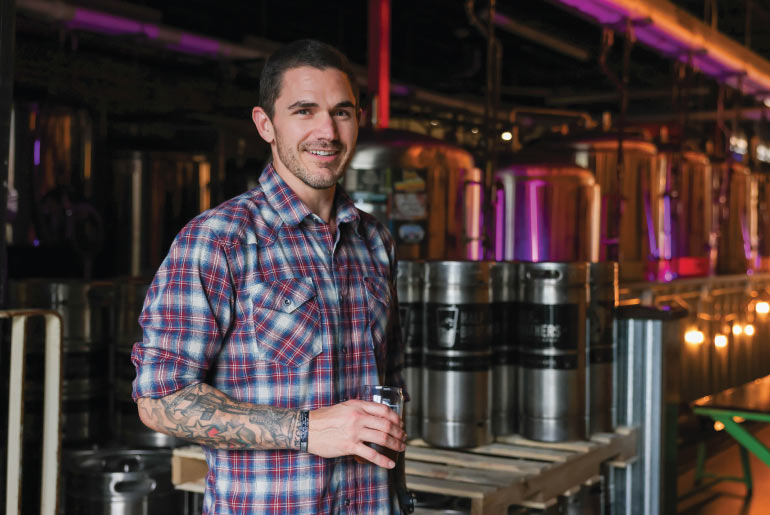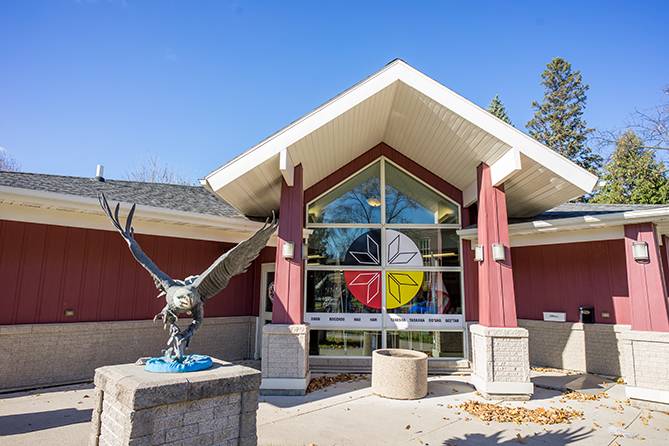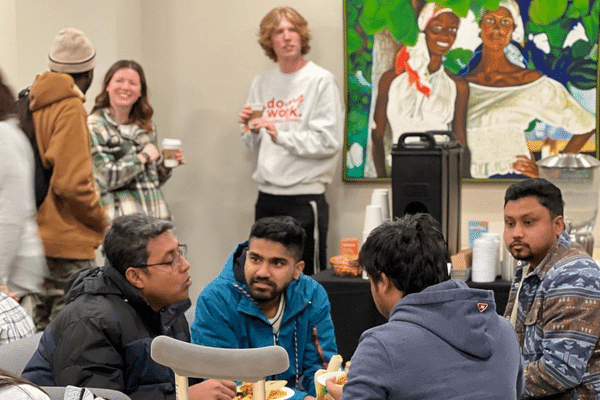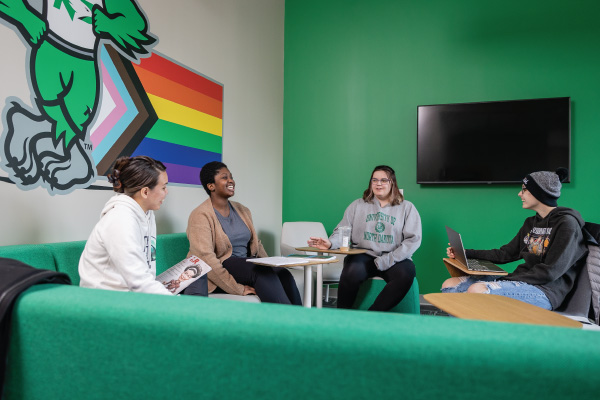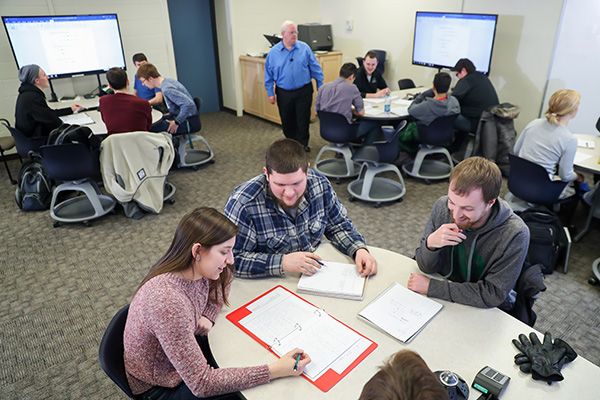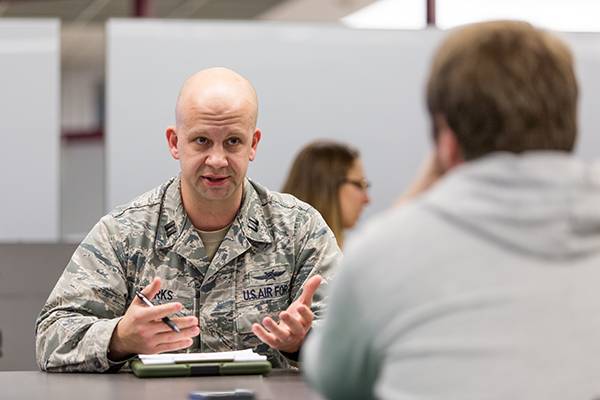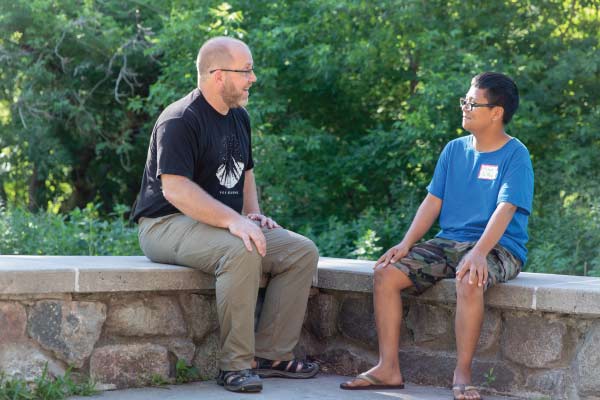In the Trenches
Stepping Out of the Darkness is a three-part series on mental health in medicine, in education, and in communities. As mental and behavioral health is a rising concern among University of North Dakota students, staff and alumni, we are bringing to light stories and resources for more informed conversations and understanding.
Our communities offer identity, but they can incidentally carry distinct challenges. Hear about struggles faced by marginalized individuals and the UND alumni, faculty and staff who are helping them heal.
“I think people have a skewed idea about the kind of person who joins the military. More often than not, they’re just young folks dealing with certain issues from childhood and craving structure. That was certainly the case with me,” said Matt Eidson, ’18, ’21. He served in the Marine Corps from 2008-15 on deployments to Iraq, Afghanistan, Japan and South Korea. They were years that would later take a toll on his emotional and mental health.
After completing his commitment, Matt enrolled at the University of North Dakota, eventually landing in the English program. He took on a lot: multiple internships, editor of UND’s Dakota Student newspaper, a full load of credits, side jobs – and politics.
During his final semester of undergrad, he ran for a seat in the North Dakota House of Representatives after working as a field organizer for a state political party. He won, but the process of getting there wasn’t as fulfilling as he expected. “In a lot of ways, a political candidate is dehumanized. I would deal with a lot of really negative interactions going door to door,” he explained.
During the campaign, Matt began to recoil. An introvert, he was comfortable being alone in his apartment, but his need for isolation became more intense. He stopped replying to emails from his professors, stopped knocking on doors and didn’t leave his apartment for weeks.
“I spent three weeks lying on the floor somewhere between mentally exhausted and physically restless, but I couldn’t do anything about it,” Matt recalls. “That was the first time I realized that something might be wrong.”
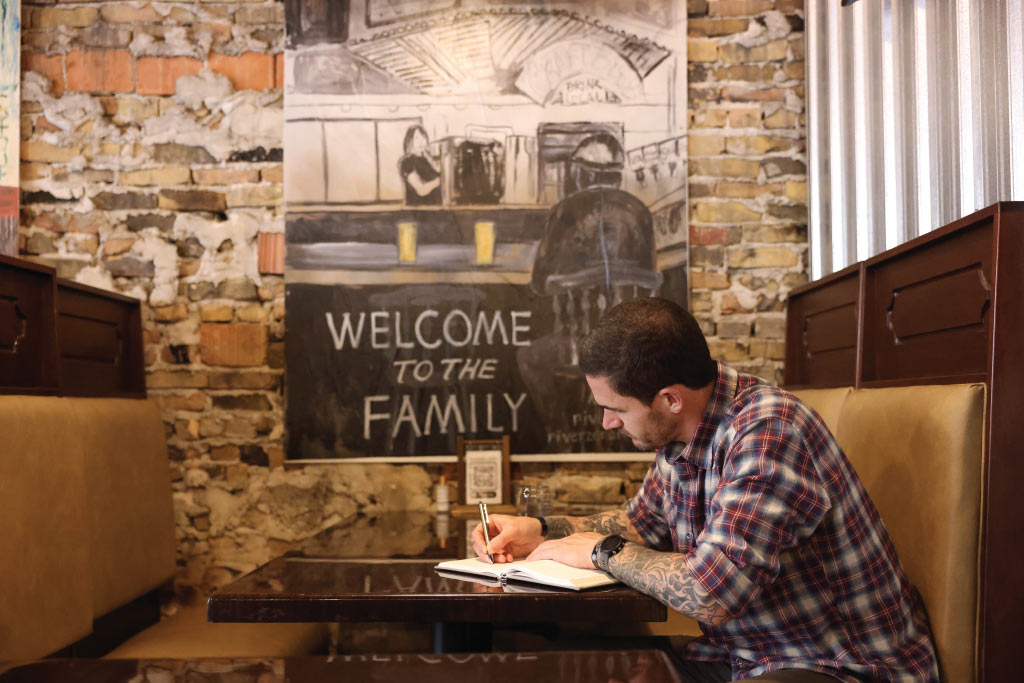
Writing started as basically trauma processing.
ACCESSING CARE
Because of Matt’s military training, he was hesitant to get professional help. “Marines are a group of young men and women who have been told from day one of boot camp, ‘You’re better than everybody else. You’re better trained. You’re a hard-ass," he explained. “And then to take that mindset and be put in a position where you have to prove to somebody else that you’re broken – it’s a big step.”
For veterans like Matt, the process of getting mental healthcare through the U.S. Department of Veterans Affairs (VA) is complicated. The paperwork alone is enough to turn away even the most medically literate.
Once he approached the VA, it still took five months to get an initial assessment. After trial and error, he eventually found a therapist, a veteran, who has been a large part of his recovery.
While better access to mental healthcare for veterans has been a longtime agenda item for federal VA officials, there are other groups of people who face similar barriers to care: BIPOC (Black, Indigenous and People of Color), rural populations, ELL (English Language Learners), people with disabilities, and LGBTQIA+ (Lesbian, Gay, Bisexual, Transgender, Queer and/or Questioning, Intersex, Asexual), to name a few.
In recent years, the attention to providing culturally affirming care (care that considers the origins and identities of patients and adapts treatments accordingly) has been growing in academia and practice.
Lauren E. Chapple-Love, Ph.D., ’18, (she, her, Dr.) is a licensed counseling psychologist and provides Diversity, Equity & Inclusion (DEI) consultation in Las Vegas, Nevada. The state has the largest disproportion between the number of patients who need doctoral-level mental healthcare and those who can provide it. Mental health professionals often work double-time to make up for the deficit.
For example, Dr. Chapple-Love has her own consultation, forensic services and training business, Elle Psychological Services, LLC, and also provides clinical services at another private practice, Southern Nevada Psychological Services. Through both practices, she works to establish trust with the communities she serves – LGBTQIA+, BIPOC and others.
“I think it’s very common for a person that has an identity factor within a marginalized community to have gone to a medical or mental health provider who has not been affirming and has not felt safe. This is certainly not limited to folks within these marginalized communities,” said Dr. Chapple-Love.
Providers who are open about their own identity factors often draw in patients who share similar identities. In Dr. Chapple-Love’s office, symbols and art are displayed to resonate with the patients who walk through her door. She includes statements like this one on her advertisements and website that offer an open invitation: “I recognize it can be difficult to find clinicians in our community, who look like us, who I don’t have to explain my culture to. We are here. I am here.”
Counseling Center eases the barriers to access mental health services
ADDED STRESS
Matt served in the state legislature for two years before resigning in the fall of 2020. Although he didn’t hide the reason, he wasn’t prepared for the public spotlight on his mental health. His time in the Marines combined with events from his childhood have kept him in heightened fight-or-flight mode with side effects of PTSD, depression and anxiety.
“There are so many instances where my mind feels like my own worst enemy,” said Matt. “It’s exhausting. In my mind, I understand all my coping mechanisms, but it’s not enough to know that these are problems. You have to learn how to maneuver them.”
Similar to how military veterans often have an added layer of stress that lingers after active duty, studies show individuals from stigmatized social categories (culture, gender, race, socioeconomic class, age, sexual orientation, intelligence, etc.) experience excess stress on top of daily hassles that can compound, affecting mental and physical health.
As a Black, Queer woman, Dr. Chapple-Love recalled acts of discrimination she experienced throughout her life, including during her time at UND: “When we’re talking about microaggressions, or smaller incidents that tend to happen – they’re like sandpaper,” she explained, specifying that not all acts are intentional or mean-spirited. Some are due to lack of exposure and understanding of different cultures and identity factors. She emphasized the importance of taking responsibility and doing internal work to learn histories and triggers of marginalized populations. “It's not that they derail my entire week, but enough of these incidents can have a significant impact in the same way that macro or more overt statements or aggressions can have on someone.”
In her practice, she uses her forensic training to provide trauma-informed mental healthcare, using training she gained through a UND practicum working with law enforcement officials, firefighters and in the jail systems. “If you don't provide a safe space within your practice, you will watch people leave.”
We are here. I am here.
GROUNDBREAKING WORK
With a master's degree in forensic psychology, Dr. Chapple-Love came to UND’s Counseling Psychology doctoral program for its “groundbreaking work” that was making waves in academic circles. Exposure to different cultures was also a draw.
She plugged into UND’s Multicultural Center, volunteered at powwows, and soaked up the research and hands-on learning the department offered. Faculty like Tamba-Kuii Bailey, Ph.D., guided her.
Dr. Bailey was named Special Assistant to the President for Diversity and Inclusion earlier this year. He came to UND with an expansive portfolio not just in academics, but also working on the front lines in community mental health, an inpatient hospital unit for children and adolescents, and mental health insurance. He saw the gamut of barriers and breakdowns in providing competent mental healthcare for diverse communities. The experiences inspired him to pursue academia.
“I knew that as a professor, I could impact an even larger number of people and help shape a generation of therapists who think about our ethical obligation to use culturally appropriate, evidence-based practices so that all patients can get the best possible care,” Dr. Bailey explained.
At UND, he’s had a hand in some of the groundbreaking work in research and cross-campus actions, including co-chairing the University DEI Task Force. He’s partnered with colleagues to better understand what marginalized communities are experiencing on UND’s campus.
As part of the 1% of UND faculty who identify as Black-only, Dr. Bailey speaks highly of his experience, but says that’s not the case for all. “I feel supported by the President; I feel supported by the Provost. But it is important to note that the feeling of safe space isn’t the norm for everyone on this campus,” he said. “So, the question becomes, ‘How do we ensure more opportunities and space for faculty, particularly for those who come from underserved communities, those with disabilities, LGBTQIA+ and faculty of color?’”
Earlier this year, Dr. Bailey launched the Inclusion Ambassadors Program. Thirty-six staff and faculty representing various departments, genders and races across campus are members of the inaugural class. The purpose of the program is to create a partnership between the Office of Diversity and Inclusion and each college/school or division to engage in diversity, equity, and inclusion efforts at the University. He sees this program as a way to help recruit and retain standout faculty and staff at UND.
“UND has come a long way, but we still have a long way to go. My hope is this program and other efforts help take care of the mental and emotional pressure faculty come in with. I hope they feel valued by the University and assured that they have a voice here.”
THE ROAD TO HEALING
Mental health healing is not a cut-and-dried process. As someone who’s been in the trenches with patients, Dr. Chapple-Love compares it to travel: “Some days, I’m standing on the side of the road [with my patient], and we’re walking it out. Some days, we’re in a car with air conditioning. So, I think that success is measured through the person. And it’s not always a linear pathway.”
A “lifelong journey” is how Matt describes it. It’s taken six years to get to the point he’s at now. After a stint in Missouri, he’s back in Grand Forks working a dream job as a brewer at Half Brothers. It’s brought healing in an unconventional way.
“It’s semi-regimented like I had in the military, but it’s also helped me rearrange my expectations. It’s taught me to not be so hard on myself. It’s made me happier,” he says. “And the job has been helpful because of the intense satisfaction I get from it. It fills me with a sense of self-worth I haven’t had in a long time.”
Matt’s also used writing as a coping mechanism. “Writing started as basically trauma processing,” he said. Through the UND English program, he’s written memoirs, short stories and fiction related to his experiences in combat and as a veteran. Now as a graduate student in the program, Matt’s military experience is not the centerpiece it once was in his stories – a sign to Matt that healing is taking place.
While Matt’s wrapping up his compilation of short stories for his master’s thesis, he thinks about how a book on his life would read, what title he would give it and how each of his identities will be represented within its pages.
“‘Marine’ would be a chapter, not the title of the book. ‘Politician’ would be a chapter. ‘Brewer’ would likely be a chapter of the book. A lot of my healing has come through accepting all those experiences – not shoving them down, not trying to forget about them, not covering them up – but accepting them, highlighting the good things and using them to move forward.”
MENTAL HEALTH COMMUNITIES AT UND
Earning a degree is hard work. Here are just a few of the hubs where students can receive help to thrive inside and outside the classroom.

